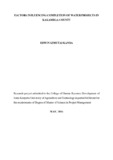Please use this identifier to cite or link to this item:
http://ir-library.mmust.ac.ke:8080/xmlui/handle/123456789/1283Full metadata record
| DC Field | Value | Language |
|---|---|---|
| dc.contributor.author | Kanda, Edwin | - |
| dc.date.accessioned | 2019-04-25T11:31:49Z | - |
| dc.date.available | 2019-04-25T11:31:49Z | - |
| dc.date.issued | 2016-05-01 | - |
| dc.identifier.uri | http://r-library.mmust.ac.ke/123456789/1283 | - |
| dc.description.abstract | Inability to complete projects is among the challenges faced in the course of executing construction projects. The most widely used project success criterion is meeting time, quality and cost requirements. The main aim of this study was to investigate factors that influence completion of water projects in Kakamega County. The specific objectives of the study were to determine the effect of client related factors, contractor related factors, consultant related factors, and external factors. The instrument of data collection was questionnaires. The target population consisted of 104 employees working for two water projects in Mumias and Lugari both in management and lower levels. Simple random sampling was used to select 90 who formed the sample size out of which, 74 respondents returned the questionnaires representing 82% response rate. Analysis of data was done using descriptive and inferential statistics using correlation and regression. The main factors that were associated with client included financial capacity, owner interference, the imposition of contract duration , decision-making ability and change in project scope which had a weak but significant positive relationship with project completion (r = 0.302, p <0.05). The contractor related factors studied were financial capacity, equipment availability and quality, skilled workforce, site management ability, material availability and control over sub-contractors which had a strong and significant positive relationship with project completion (r = 0.668, p < 0.05). Consultant related factors considered included experience, skilled personnel, co-ordination, site supervision and decision-making ability and they had a significantly strong positive relationship with project completion ( r = 0.643, p < 0.05). External factors of political interference, industrial action, regulation, taxation and material unavailability in the market had a weak but significant positive relationship (r = 0.312, p < 0.05) with project completion. The overall regression model gave R2 of 0.583. This showed that that the variations around the means in client-related factors, consultant-related factors, contractor-related factors and the external factor is about 58.3%. In conclusion, the most important factors influencing project completion were the contractor, consultant, external and client related factors respectively. | en_US |
| dc.language.iso | en | en_US |
| dc.subject | Project completion, water projects, Kakamega County | en_US |
| dc.subject | Project Management | en_US |
| dc.title | FACTORS INFLUENCING COMPLETION OF WATER PROJECTS IN KAKAMEGA COUNTY | en_US |
| dc.type | Thesis | en_US |
| Appears in Collections: | School of Engineering and Built Environment | |
Files in This Item:
| File | Description | Size | Format | |
|---|---|---|---|---|
| MSc Thesis PM.pdf | Main Thesis | 648.38 kB | Adobe PDF |  View/Open |
Items in DSpace are protected by copyright, with all rights reserved, unless otherwise indicated.
